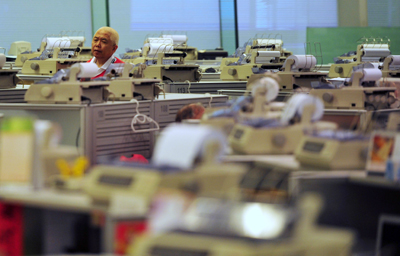Friday, 28 August 2015 09:55
 SHANGHAI: Asia stocks staged another rally in early trade on Friday, taking heart from strong US growth figures to cement a recovery after a torrid week when global markets took fright over China’s gloomy economic outlook.
SHANGHAI: Asia stocks staged another rally in early trade on Friday, taking heart from strong US growth figures to cement a recovery after a torrid week when global markets took fright over China’s gloomy economic outlook.
Tokyo led the gains, with Hong Kong and Shanghai in tow, and oil prices zoomed higher after the US reported a surprisingly strong new estimate of economic growth in the second quarter.
The latest data, which showed the world’s biggest economy grew at an annual rate of 3.7 percent in the April-June quarter, buoyed markets that have been worried over the prospects for China’s economy, which accounts for some 13 percent of global output.
“We end the week on another positive note, and the craziness we’ve seen over the last couple of weeks seems to be dissipating,” Chris Weston, chief markets strategist at IG Markets, said in a note.
Markets across the world saw recoveries, with the S&P 500 surging to its second straight gain on Wall Street, while stock indexes in London and Paris also rose.
In Asia, Tokyo rose 2.77 percent, while Hong Kong gained 0.50 percent in morning trading and Shanghai was 1.93 percent higher.
The gains across key Asian bourses first began on Wednesday, when markets — with the exception of Shanghai — began to find their footing. The Chinese market made substantial gains the following day, however, indicating prices have, for the moment, found their floor.
– China mitigating concerns? –
==============================
The latest advances come as a relief to investors who at one point saw $ 8 trillion wiped off global markets in a stock market rout led by fears over the outlook for China.
Beijing has sought to mitigate those concerns in recent days by taking a series of measures, from allowing its massive state pension fund to invest up to 30 percent of assets in stocks, cutting interest rates and slashing the amount of money banks need to hold in reserve.
The measures are not only aimed at boosting cash flow in China, but also at reviving confidence that Beijing can steer the economy away from a hard landing and keep global growth on course.
Markets took their lead, however, from the US growth report, which, though it covered only through June, confirmed the economy has not yet been hit much by China’s downturn.
It added to other strong recent data on consumer confidence and durable goods orders.
“The US economy continues to perform on a consistent basis… (showing) that its economic recovery is sustainable,” said FXTM chief market analyst Jameel Ahmad.
Concerns in the recent stock market panic focused on the fact that in recent years China has been the main driver of global growth, with Europe in the doldrums and the United States struggling to maintain a recovery.
But Chris Green, an Auckland-based strategist at First NZ Capital Ltd., said the figures showed the US economy was in better shape.
“It gave credence to the story that the US economy could be building momentum,” he said.
“We seem to have gained some sort of stability and people are focusing more on the underlying strength of the US economy.”
– Dollar boosted –
===================
The latest data boosted the dollar against both the yen and the euro, as well as oil prices.
In Tokyo trading on Friday, the dollar touched one-week highs before falling back to 120.92 yen and $ 1.1266.
US benchmark West Texas Intermediate, meanwhile, gained 37 cents to $ 42.93 and Brent crude rose 22 cents to $ 47.78.
Eyes were turning toward a central banking symposium that the US Federal Reserve was hosting in Jackson Hole, Wyoming from Thursday to Saturday.
Fed Chair Janet Yellen is not attending, but her deputy, Stanley Fischer, will make keynote remarks on Saturday that could point to whether the central bank believes the global turmoil is severe enough to hold off on a long-expected hike in interest rates.
On Wednesday, New York Federal Reserve head William Dudley, seen as close to Yellen and Fischer in his thinking, said that the Chinese turmoil had made the arguments for a rate rise in September “less compelling”.
Gains from upbeat releases in the US were tempered, however, by data in Japan that showed that inflation in the Asian powerhouse fell back to zero in July while household spending dropped for a second straight month.



























